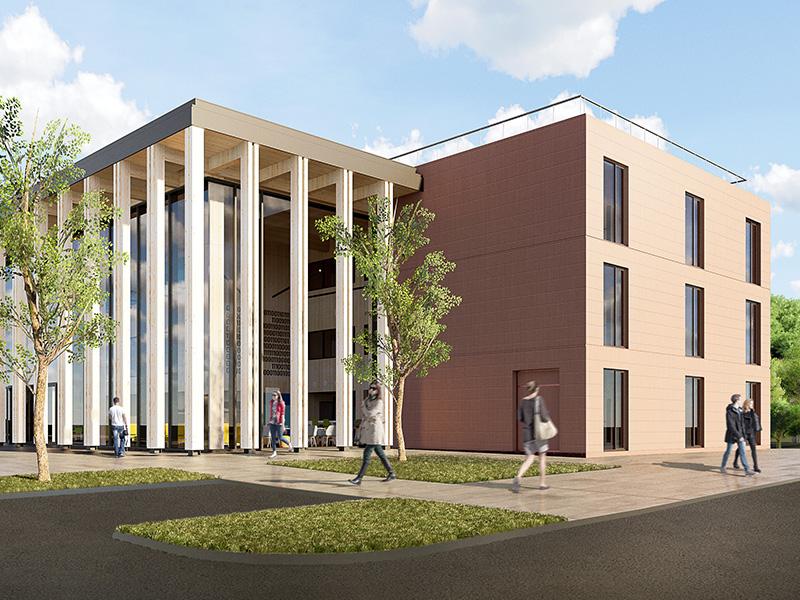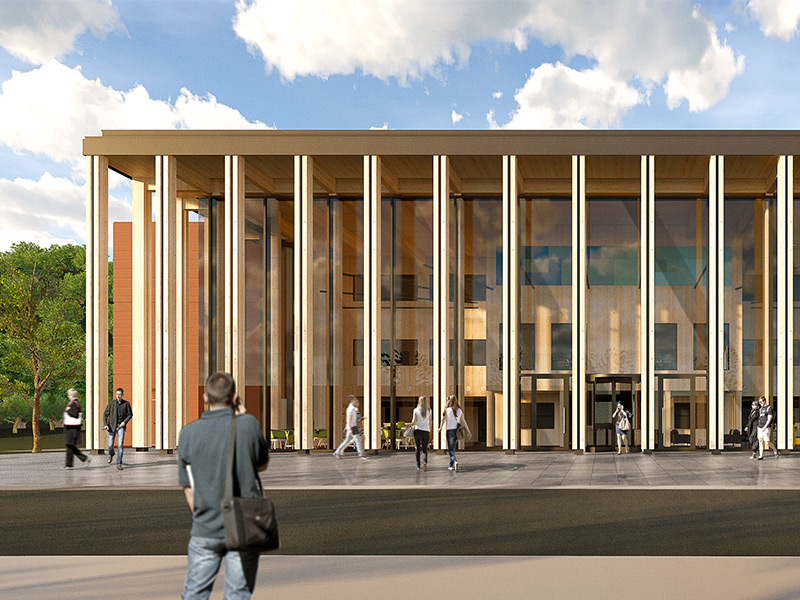A £9million cutting-edge Centre for Cyber Security in Hereford will take a major step forward through a collaboration between the University of Wolverhampton and Herefordshire Council.
How the new Centre for Cyber Security will look

The council is being urged to approve the launch of a new joint venture company with the University to build the innovative centre at Skylon Park, creating 190 jobs and helping lead the UK’s fight against cyber crime.
The University and Herefordshire Council will make a total loan of £5 million to the new company, in return for a shareholding. The new centre will offer high quality research facilities through the University’s Wolverhampton Cyber Research Institute (WCRI) as well as providing office space for cyber businesses and advanced training facilities designed specifically to tackle threats in cyberspace.
As well as creating high-value jobs, the centre will help attract inward investment and form part of a nationally-important Cyber Triangle with GCHQ in Cheltenham, the Government Cyber Centre in Newport, South Wales, and Qinetiq in Worcestershire.
The University of Wolverhampton has already successfully secured grant funding of £4 million from the Marches LEP Local Growth Fund and the European Regional Development Fund (ERDF).
Councillors are being recommended to back the setting up of the joint venture company when they discuss the plans on December 13.
The centre will offer more than 1,000 sq m of research and development floorspace in three cyber laboratories, business space for 16 companies and form an integral element of the University’s Cyber Research Institute.
Local, regional and national businesses will be able to participate in cyber security training, try new products and take part in developing new technologies.
The council says the joint venture will help ensure the centre brings the maximum economic benefit to the area and the Hereford Enterprise Zone.
Sixty five per cent of all large UK companies reported a cyber breach in the last year and threats to cyber security are persistent and constantly evolving.
Professor Ian Oakes, Deputy Vice-Chancellor at the University of Wolverhampton, said: “The University has already formed strong, collaborative relationships with key companies to engage with cyber research, training programmes and enterprise development and has a number of research teams associated with the development of cyber security.
“Our strategy is to bring together our collective expertise in a centre of excellence with partners both in the UK and internationally.

“The new centre will organise, facilitate and support the development of cyber security on a global scale whilst at the same time present us with opportunities to develop high quality academic, vocational educational and training programmes to address the digital skills shortage being experienced nationally.”
Councillor David Harlow, Herefordshire Council Cabinet Member for Economy and Communications, said: “Cybercrime currently costs the UK an estimated £20 billion a year, and tackling this issue is at the forefront of global innovation. The new Centre for Cyber Security will contribute hugely to this burgeoning new field, including providing business space for research, product testing laboratory space and education and training, and will attract significant investment to the region.
“Herefordshire is already home to a cluster of cyber security businesses, and we are proud to be at the cutting edge of this emerging global field of expertise.”
Andrew Manning Cox, Chairman of the Hereford Enterprise Zone, said: “The new Centre for Cyber Security at Skylon Park will put the region right at the forefront of the fight against cyber crime in this country.
“It will create up to 190 high-value jobs and establish Skylon Park as the natural home for cyber security research and innovation in this country. We are already home to a cluster of businesses working within the sector and the centre will be vital to building on this expertise.”
The new centre will provide innovation workspace for small and start-up businesses to operate from, offering consultancy support from the University and shared facilities including laboratory space and training rooms. It will offer a range of specialist facilities for the cyber sector including server space and high speed broadband as well as research and development laboratory space.

